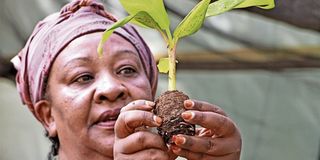Teacher hardening off seedlings for profit

Winfred Mbolu admires a tissue culture banana seedling in her farm in Machakos County. Together with her husband, Sila Mbolu, the couple harden off plantlets bought from tissue culture laboratories. PHOTO | PIUS MAUNDU | NATION MEDIA GROUP
What you need to know:
- Regular workers at the nursery include two young men hailed as grafting specialists.
- According to Winfred, hardening off banana plantlets bought from tissue culture laboratories involves planting them temporarily in a greenhouse.
- Once they arrive from the lab, the plants are carefully removed from the jars where they are normally grown and the growing media washed off with great care.
- Hardening off is to ensure that they acclimatise and, therefore, enhance their survival once they are transplanted in the fields.
Far from the hustle and bustle of Tala Township on the Nairobi-Kangundo Road in Machakos County, one is welcomed by humming, whistling and the clanking of farm tools at Sila Mbolu’s homestead.
One easily spots out a shade net structure next to a beautiful bungalow that is the family home. The shade net hosts assorted young palms and countless common tropical fruit-tree seedlings.
“We add value to citrus fruits, mangoes and macadamia seedlings by grafting indigenous rootstock with scions of desirable traits, as well as hardening off tissue culture bananas to enhance their survival once they are transferred to the fields. We also sell palms,” Winfred Mbolu, Sila’s wife, says as she takes Seeds of Gold on a guided tour of the farm.
Regular workers at the nursery include two young men hailed as grafting specialists. The highly sought youth travel from Embu County when need arises.
“They also help us source high quality Murang’a 20 macadamia scions, which mature in three to four years,” says Winfred.
Informed by the resilience of lemons and the growing demand of pixie in the market, the nursery uses pixie scions harvested from disease and pest-free plots in Makueni County to graft onto lemon rootstocks. Their main business is, however, hardening off banana seedlings.
According to Winfred, hardening off banana plantlets bought from tissue culture laboratories involves planting them temporarily in a greenhouse.
Once they arrive from the lab, the plants are carefully removed from the jars where they are normally grown and the growing media washed off with great care.
They are then taken to the hardening nursery shed soon after where they are transplanted into seedling trays and must be watered twice or once depending on weather conditions.
After about a month, the seedlings are ready to be transferred into plastic pots, which must contain sterilised soil and manure.
They will be ready for sale after at least a month at between Sh120 and Sh150, explains Winfred.
ENDURE THE SHOCK OF NEW ENVIRONMENT
Hardening off ensures that they acclimatise and, therefore, enhance their survival once they are transplanted in the fields.
Prof Aggrey Bernard Nyende, the director of the Institute of Biotechnology Research at Jomo Kenyatta University of Agriculture and Technology (JKUAT), says the hardening helps the bananas propagated from cloned seedlings to take a shorter period to fruit compared to the ones propagated from suckers.
“Suckers take time as they endure the shock of the new environment,” he says.
"Although many smallholder farmers still use suckers to propagate bananas, we discourage them because they transfer pests and diseases from one orchard to the other, and produce relatively lower yields,” Prof Nyende adds.

Winfred Mbolu waters seedlings in her farm. She explains that hardening off banana plantlets bought from tissue culture laboratories involves planting them temporarily in a greenhouse to ensure that they acclimatise and, therefore, enhance their survival once they are transplanted in the fields. PHOTO | PIUS MAUNDU | NATION MEDIA GROUP
The tissue culture technology has not only drawn new banana farmers but also spawned multiple agribusiness enterprises such as the one the Mbolus run.
Winfred, the head teacher at Mtito Andei Primary School in Makueni County and the current national woman representative at Kenya Primary Schools Heads Association, says the farming project began when she decided to green her compound in 1997.
A friend led them to JKUAT, where the couple acquired the banana plantlets. “The banana garden opened our eyes. We saw a business opportunity and quickly borrowed Sh200,000 from a local sacco to establish the nursery for hardening off tissue culture banana seedlings.
The first one year was rough. We barely made any sale because tissue culture bananas were strange to people. But we persevered. The seedlings were almost wasting away when we registered the first sale towards the end of the year. We diversified the portfolio to other tropical fruits to spread out the risks,” recounts Mbolu.
The seedlings of the Williams, Grand Nain, giant and sweet bananas, Uganda green and plantain varieties are mainly bought by individual farmers, non-governmental organisations and development agencies running programmes to promote tropical fruit farming Ukambani and beyond.
The palm seedlings are bought by affluent homeowners and hotels, going from Sh500 to Sh1,500 depending on the variety.





